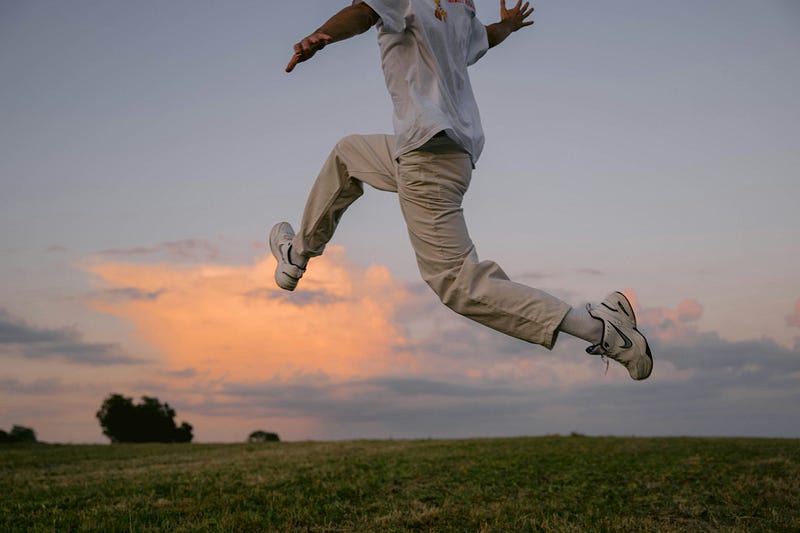# Finding Focus: An Unexpected Journey Through Film and Dreams
Written on
Chapter 1: The Catalyst
It’s fascinating how seemingly trivial events can serve as a wake-up call to redirect our lives.

Photo by Fien Schelstraete on Unsplash
Recently, I watched the film "Lucy," featuring Scarlett Johansson and Morgan Freeman. IMDB categorizes it as an Action Sci-Fi Thriller, summarizing it as a story about a woman who, caught in a perilous situation, turns against her captors and evolves into a formidable warrior who transcends human reasoning.
Despite its modest rating of 6.1 and somewhat wooden performances, the film captivated me with its exciting action sequences. The central theme revolves around the notion that humans only tap into 10% of their brain capacity. It chronicles a woman's transformation as she unlocks her full cognitive potential.
Morgan Freeman, portraying a scientist, delivers a compelling lecture on human capabilities, claiming that prey animals utilize a mere 3% of their brains, predators about 5%, and humans only 10%. He provocatively suggests that if we could access even 20%, we could master our own healing, and at 30%, we could influence others.
While the idea that we only use 10% of our brains is widely regarded as a myth, originating from studies conducted in the 1890s involving child prodigy William Sidis, it does raise intriguing questions. Modern research using brain scans reveals that all brain regions are active during various tasks, with some areas more engaged depending on the action or thought process.
Can we truly enhance our cognitive abilities?
Historically, scientists believed that the brain could not generate new neurons, but recent findings have overturned that belief. In the 1970s, researcher Michael Kaplan conducted experiments on mice, demonstrating that those exposed to toys and mental challenges developed new brain cells and utilized existing neurons more effectively.
In 2010, a study by Harvard Medical School revealed that mindfulness meditation fosters the growth of new brain tissue in regions linked to self-awareness and memory. Additionally, research from the University of Zurich indicated that acts of kindness can enlarge the area responsible for processing sensory information and emotional responses.
Neuroplasticity—the brain’s ability to reorganize and fortify neural connections based on new experiences—suggests that we can enhance our cognitive capabilities through learning and practice. This principle supports the idea that while mastery of a skill may require extensive practice, consistent effort leads to improvement.
The evening following my viewing of "Lucy," I experienced a vivid dream in which I found myself on a serene island reminiscent of Bali, participating in a meditation workshop aimed at unlocking our full potential. The activities included various yogic practices, such as specialized breathing techniques and meditative exercises focused on mindfulness.
At the workshop's conclusion, we were invited to extend our stay for three months to achieve our utmost potential. I pondered this opportunity, feeling revitalized after a week of wholesome eating, exercise, and meditation. However, I ultimately declined, citing commitments I felt obliged to honor. Upon waking, I realized that the only promises I had made lately were to myself—specifically, my commitment to pursue my writing with seriousness this year.
I have been productive, recently achieving 175 articles on Medium, which fills me with pride! However, I recognized that I had neglected other aspects of my life. My diet had strayed from healthy choices, and while I indulged daily in my sweet green tea matcha latte, my exercise routine had faltered due to the rainy season. Additionally, I had not prioritized meditation, despite being surrounded by 300 temples in Chiang Mai.
I resolved to restore balance across various facets of my life. While some suggest there are seven or even twelve areas to consider, I prefer to concentrate on six key areas:
Body: I've been consistent with stretching and core exercises but plan to eliminate sugar and resume swimming laps once the rain subsides.
Heart: My communication with friends and family has been infrequent, so I aim to write more regularly for deeper connections. I also indulge in light-hearted cat videos for a daily dose of laughter.
Mind: I actively engage in brain games and language learning through Duolingo, alongside extensive reading to broaden my knowledge.
Spirit: I intend to resume my daily meditation practice at dusk, which I neglected during a recent illness.
Finances and Personal Safety: These areas are currently stable.
Legacy / Contribution: This remains a work in progress. Although I have yet to define my life's purpose, I strive to be kind daily and ensure my actions leave a positive impact on the world, even if it's as simple as picking up litter.
In the film, Lucy stated, “Time is the only true unit of measure. It gives proof to the existence of matter. Without time, we don’t exist.” While I appreciate this quote, it resonates differently for me. Time relates to memory, and many creatures exist without it. I firmly believe in the significance of the present moment; however, we can still track our growth through past memories and set future goals to guide our journey.
Thus, I am stepping into the "No Zero Days" mindset, aiming for daily incremental improvements across the six areas mentioned. I believe this approach is key to achieving our full potential—small, consistent steps lead to profound change (tiny raindrops create a vast ocean). Even if I don't reach the full cognitive capacity depicted in "Lucy," I will cultivate neuroplasticity that keeps my mind agile, allowing for personal growth and tranquility. That sounds absolutely perfect to me.
Chapter 2: The Power of Dreams and Motivation
The film "Inception" delves into the psychology of dreams, exploring the depths of the subconscious and how our dreams can motivate us to tap into our potential.
Oprah Winfrey’s motivational talk, "If This Doesn't Motivate You, Nothing Will," emphasizes the power of manifestation and self-belief in achieving our dreams.